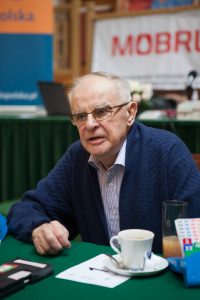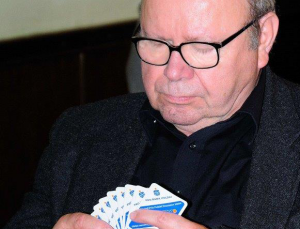
Andrzej Wilkosz (1935-2012)
 Andrzej played many times on the Polish Open Team between 1963 and 1987. His main achievements were Gold medal of World Teams Championships in 1978 and three European Championships medals in 1963, 1970 and 1973.
Andrzej played many times on the Polish Open Team between 1963 and 1987. His main achievements were Gold medal of World Teams Championships in 1978 and three European Championships medals in 1963, 1970 and 1973.
At the turn of the century he played successfully in Senior Teams events, winning 6 world and European medals between 1995 and 2001.
In the Polish league, he played always for Wisła Kraków club, winning 16 medals between 1964 and 1993. He was the first player to achieve the highest classified ranking in Poland – “International Grand Master”.
A regular contributor to bridge press in Poland, he was the author of the book “Decydujące rozdania” (The decisive boards). He devised the Wilkosz 2D opening as weak two-suiter with 5-card suits other than both minors, which used to be very popular in Poland but is disallowed in the most of the world.
He qualified from the Faculty of Metallurgy in the AGH University of Science and Technology in Kraków and was awarded the Knight’s Cross of the Order of the Rebirth of Poland.
Andrej died in Mielec, one day after playing in his last regional tournament.
His wife, Maria Wilkosz (1935-2017) also played bridge. She didn’t participate in international competitions, but won three medals in Mixed and Women Polish Championships.
Julian Klukowski (1939-2017)
 Julian played many times on the Polish Open Team, starting with a bronze medal in the 1963 European Championships. In both 1981 and 1989 the Polish team that included Klukowski won the European Championships and went on to bronze medals in the Bermuda Bowl. Later he won many Senior medals, becoming world number 1 in this category. Throughout his life he remained successful in Polish open events. His last international event was the World Bridge Games in Wrocław in 2016, where the Polish Seniors lost in the round of 16. He planned to participate in the Polish Senior Trials in 2017 but health troubles forced him to give up.
Julian played many times on the Polish Open Team, starting with a bronze medal in the 1963 European Championships. In both 1981 and 1989 the Polish team that included Klukowski won the European Championships and went on to bronze medals in the Bermuda Bowl. Later he won many Senior medals, becoming world number 1 in this category. Throughout his life he remained successful in Polish open events. His last international event was the World Bridge Games in Wrocław in 2016, where the Polish Seniors lost in the round of 16. He planned to participate in the Polish Senior Trials in 2017 but health troubles forced him to give up.
He was elected to the EBL Hall of Fame in 2017 but died before having the opportunity to accept this distinction. In the Polish league, he played for various Warsaw teams – Juvenia in the 1960s, Marymont around 1980, for Silesia Gliwice in the 1990s and in the last few years for a team representing Poznań. His teams won 16 medals between 1961 and 1998.
Julian was a regular contributor to bridge press in Poland and the author of a bridge column in “Gazeta Wyborcza”. He was the author of a few books, about both bridge (the most important one is “Sztuka wistowania” – The art of defender play) and mathematics (“Algebra dla studentów” – Algebra for students).
He worked in the Faculty of Mathematics of Warsaw University of Technology.
In 1991 he started a second career as Piatnik’s representative in Poland – this work has been continued on by his daughter and her husband.
His first wife, Elżbieta, played in the Polish womens’ team in the 1960s. After her death in 1968 Julian took a few years break from competitive bridge; in those years, he became a doctor of mathematics. With his second wife, Grażyna, he had two daughters, Anna and Julia.



